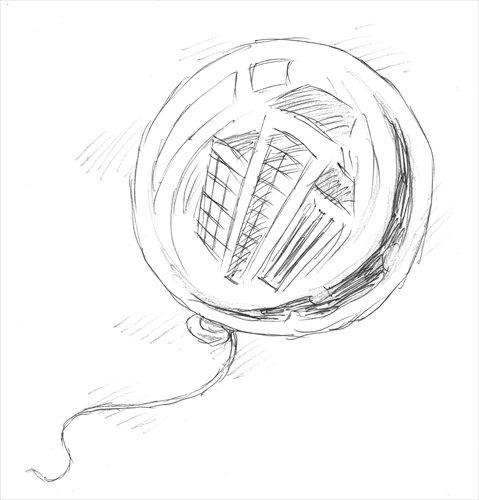HOME >> BUSINESS
China’s property bubble more perilous than Japan’s
Source:Global Times Published: 2016/6/24 0:23:01

Illustration: Peter C. Espina/GT
The purchase prices of land in China's first and second-tier cities have skyrocketed recently, indicating a possible new round of real estate recovery. But the public has expressed some serious concerns that such high land prices could lead to a property market crash. Some domestic and overseas analyses have predicted that China is likely to repeat the burst of Japan's property market bubble of the early 1990s, causing the country's economy to suffer the same lost 20 years as the Japanese economy.Before drawing such a comparison, we should take a brief look at the whole story of the collapse of Japan's property price bubble. The Japanese economy grew rapidly in the 1970s and 1980s as a result of abundant liquidity in the banking system, financial deregulation and enormous exports, which led to overconfidence in the Japanese economy. But the signing of the Plaza Accord in 1985 led the Japanese yen to appreciate against the dollar by 50 percent in less than three years, causing the country's small- and medium-sized exporters to suffer greatly, and exerting downward pressure on the economy.
To counter the situation, Japan adopted monetary easing policies such as a series of interest rate cuts, which pushed up property prices. Profit-driven domestic commercial banks also tapped into the property market by offering to grant loans to small- and medium-sized enterprises by using land as collateral. Meanwhile, the country's opening of capital accounts also prompted hot money from overseas to flow into Japan, leading to sharp increases in domestic housing prices and the overheating of the domestic economy.
As the Japanese government became increasingly concerned with the growing housing bubble, relevant government bodies decided to tighten monetary policy and increased thresholds for real estate transactions. Accompanied by a shift in the Japanese public's expectations, Japan's housing prices collapsed, and they are now at only one-third of the market's peak level.
There are essential differences between the real estate bubbles in China and Japan, so the assumption that China's will have the same outcome is unfounded. But the consequences of a housing bubble burst in China are likely to be greater than those seen in Japan.
First, Japan's property bubble reflected market behavior. After the bubble popped, the debt of private enterprises - the banks or developers - could be resolved through market-based methods such as liquidation. But in China's case, participants in the real estate industry like banks and developers are mainly state-owned enterprises (SOEs), and once the housing bubble crashes, their debt is likely to become government debt, which could ultimately be transferred to Chinese citizens.
Second, China and Japan have different systems of land ownership. In Japan, land can be privately owned, but China has two kinds of land ownership - State ownership and collective ownership in rural areas. The consequences of Japan's burst bubble at most caused an economic slump and put pressure on the country's financial system without causing serious problems for the Japanese government. But a housing bubble burst in China would lead to an economic crash on the national level.
Third, China's real estate industry is seen as a pillar industry, which was not true in Japan's case. Japan's housing prices didn't see rapid growth during the country's high-speed economic development, demonstrating that the prosperous Japanese economy wasn't rooted in the property industry or related industries.
But China's housing prices have increased simultaneously with China's rapid economic development. In addition, the Chinese government has stated in multiple documents that it regards the property sector as a pillar industry of the national economy, so the country's property sector's performance could directly influence that of the national economy.
Fourth, China and Japan have different economic strengths. Japan had become a high-income country by the time its bubble occurred. Although the dive in property values dragged down Japan's economic development, it neither led to an economic crash nor significantly lowered the quality of life for citizens. Japan has remained an economic global power, and its development in many fields is still the most advanced.
In comparison, despite China's huge economic volume, the overall economy is still undergoing industrialization and has yet to become a post-industrial society. Thus the bursting of China's property bubble will be a huge blow to the national economy, and will drive down quality of life.
The difference in the real estate sector's economic status between China and Japan means that a housing bubble burst in China will be different from that of Japan. China's system of land ownership dictates that the housing bubble's pop would come at a tremendous price. Fortunately, China's government has a much greater ability to allocate social resources than the Japanese government does, so China is still capable of deploying structural reforms to address the potential crisis of a housing bubble.
The article is based on a report by Beijing-based private strategic think tank Anbound. bizopinion@globaltimes.com.cn
Posted in: Expert assessment